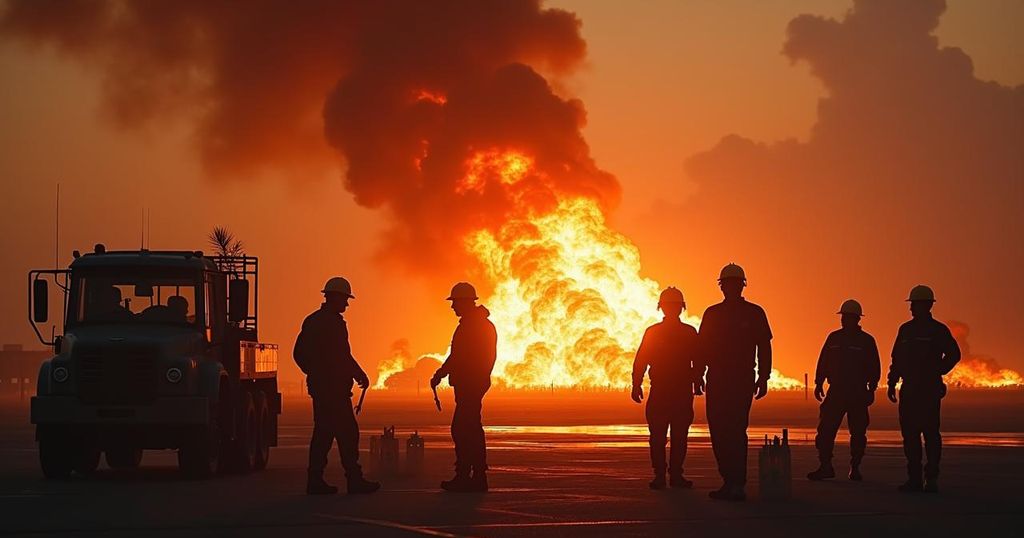Chinese Nationals Killed in Karachi Airport Suicide Bombing Amid Growing Anti-China Sentiment
A suicide bombing near Karachi’s international airport killed two Chinese nationals and injured one, with the Baloch Liberation Army claiming responsibility. The attack is indicative of escalating violence against Chinese personnel in Pakistan amid rising anti-China sentiment. Prime Minister Shehbaz Sharif condemned the attack and reaffirmed commitment to protecting Chinese interests in Pakistan, highlighting the ongoing challenges faced by the China-Pakistan Economic Corridor (CPEC) amid internal security threats.
On a recent Sunday evening, a suicide bombing near Karachi’s international airport resulted in the deaths of two Chinese nationals and injuries to one other, as reported by China’s embassy in Pakistan. This tragic incident is part of a worrying trend of violence targeting Chinese personnel and investments in Pakistan over recent years. Rescue workers at the scene confirmed that at least seven additional individuals sustained injuries due to the blast, which ignited multiple vehicles and reverberated throughout the city. The Baloch Liberation Army (BLA), a separatist faction, claimed responsibility for the attack, which they stated was aimed specifically at a convoy of Chinese engineers and investors departing from Jinnah International Airport, the busiest aviation hub in Pakistan. The Chinese embassy indicated that the incident targeted a convoy associated with a Chinese electric power company. In the aftermath, a senior Pakistani security official verified that the bombing was indeed a suicide attack and that investigations into the bomber’s background were underway. Pakistan’s Prime Minister, Shehbaz Sharif, condemned the act of violence, extending heartfelt condolences to the Chinese leadership and citizens. He reaffirmed Pakistan’s commitment to the safety and well-being of its Chinese partners, indicating, “Pakistan stands committed to safeguarding our Chinese friends. We will leave no stone unturned to ensure their security [and] well-being.” This attack is set against a backdrop of escalating violence aimed at undermining Pakistan’s ties with China. It occurs just prior to a significant meeting of government leaders from the Shanghai Cooperation Organization, a group led by China and Russia. China is a critical ally for Pakistan and plays a key role in projects under the Belt and Road Initiative, including the China-Pakistan Economic Corridor (CPEC), which has faced increasing security threats amid a resurgence of militant activity in the region. In its statement following the attack, the Chinese embassy urged Pakistan to implement robust measures to protect its citizens, institutions, and ventures within the country. The Ministry of Foreign Affairs of China has not yet released a statement on these events, which coincide with the final day of China’s national holiday period. Beijing’s investment in the CPEC, launched in 2015, is substantial, totaling tens of billions of dollars, and connects China’s Xinjiang region to Pakistan’s Gwadar port through a network of infrastructure projects. However, local antipathy towards these projects has persisted due to the limited perceived benefits they have brought to the local populace, fueling resentment particularly among separatists in the province of Balochistan. The BLA has historically been at the forefront of separatist sentiments, previously claiming responsibility for numerous attacks targeting Chinese personnel and facilities, including a 2018 assault on the Chinese consulate in Karachi that left several individuals dead and a 2020 attack on the Pakistan Stock Exchange, in which a Chinese consortium holds significant equity. Despite increased military vigilance, incidents such as the recent bombing illustrate the ongoing struggle for security in Pakistan, particularly for its foreign partners. In light of these events, the relationship between Pakistan and China continues to face intense scrutiny as they navigate the dual challenges of internal security and foreign investment. This recent attack underlines the fragility of security for Chinese interests in Pakistan, emphasizing the need for comprehensive strategic cooperation between the two nations to mitigate risks and foster a secure environment for development. Contributions to this report were made by CNN’s Azaz Syed and Saleem Mehsud in Islamabad.
The increasing violence against Chinese nationals in Pakistan reflects a broader trend of regional instability and anti-Chinese sentiment, particularly among separatist factions such as the Baloch Liberation Army (BLA). This sentiment can be traced back to local grievances regarding the economic benefits of large-scale foreign investments, especially those linked to China’s Belt and Road Initiative. The CPEC serves as a cornerstone for economic collaboration between China and Pakistan, yet it also poses security challenges as regional groups resist external influence and seek to assert autonomy. The incident near Karachi’s airport highlights the precarious position of Chinese investments in the context of ongoing militancy and domestic discontent.
The suicide bombing near Karachi airport, resulting in the death of two Chinese nationals, underscores the significant risks Chinese personnel face in Pakistan, where rising anti-China sentiment and separatist militancy threaten security and investment frameworks. Despite strong statements of protection from Pakistani leadership, the situation reflects deeper issues regarding local perception of foreign investments and the stability of regional security. Combined with recent historical patterns of violence targeting Chinese interests, this incident calls for enhanced protective measures and strategic collaboration between Pakistan and China to ensure the safety and viability of Chinese projects in the country.
Original Source: www.cnn.com








Post Comment